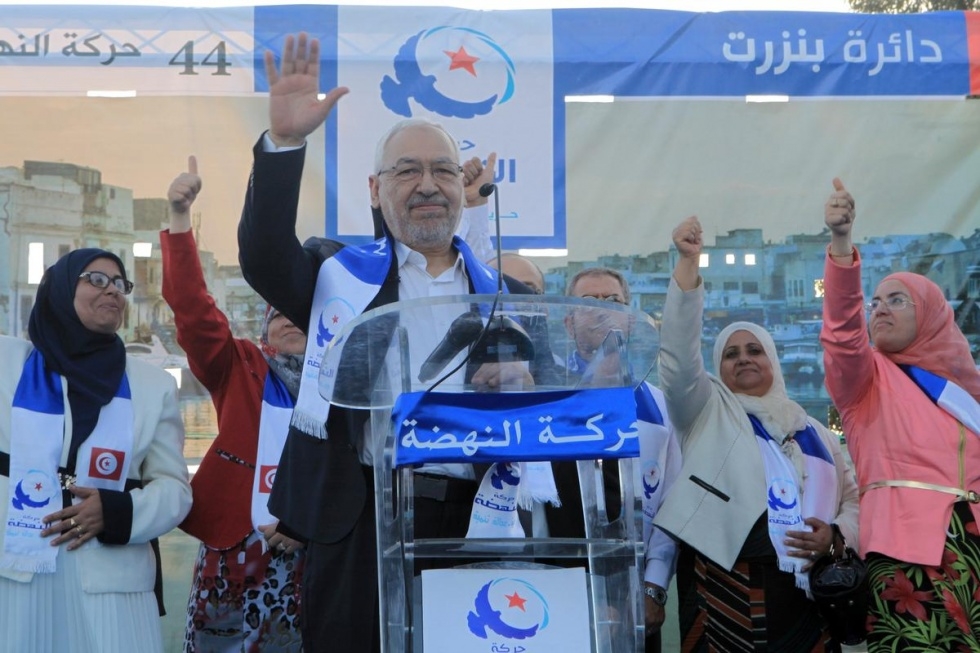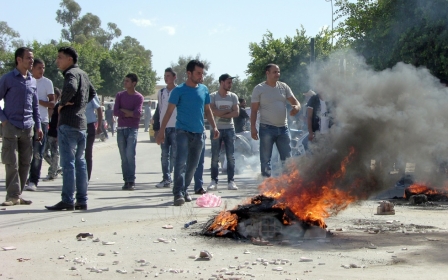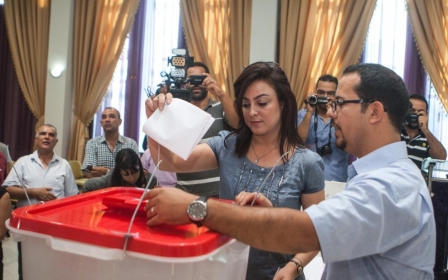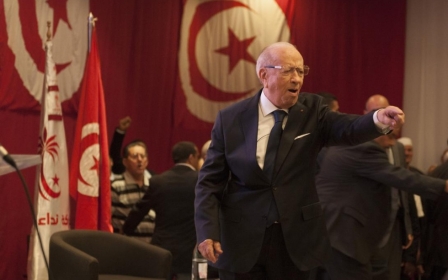Ghannouchi eyes 'unity government' after Tunisia polls

Rachid Ghannouchi, leader of Tunisia's Islamist Ennahda movement, has said he was looking to form a national unity government following this weekend's parliamentary poll.
"There is a seemingly national consensus in Tunisia regarding our calls for forming a national unity government," Ghannouchi said in an interview with Anadolu Agency published on Thursday.
He said Tunisia – which faces major economic and security challenges – needs a national unity government that enjoys grassroots support.
"No party can face these uphill challenges alone," he said.
Voters will cast ballots on October 26 for 217 members of the National Assembly, which will choose a new prime minister to replace Tunisia's current caretaker administration.
Presidential elections – the country's second since a 2011 popular uprising toppled dictator Zine al-Abidine Ben Ali – will follow on November 23. The November elections will the first time Tunisians elect their president directly post-2011, as the last presidential elections were carried out by members of parliament.
Ghannouchi predicted that his movement would win 41 percent of the assembly seats in Sunday's polls.
"We expect Ennahda will win big, as in the past," he said.
'A similar number of seats'
In 2011 polls, the Islamist movement won 41 percent (89 seats) of the country's 217-seat Constituent Assembly.
"We expect to win a similar number of seats this time," said Ghannouchi.
Ghannouchi said his movement would not field a presidential candidate in next month's election.
"Our position is that we [Ennahda] will not vie for this post," he told AA.
The Islamist leader opined that, by not contesting the highest office, Ennahda sought to achieve national reconciliation in the North African country.
"This is important to our strategy for reconciliation, power sharing and the avoidance of monopolization," he said, adding that political monopolization tended to divide society in emerging democracies.
"We have avoided the policies of exclusion and political isolation," he said.
'Reconciliatory democracy'
"This is what happened in Egypt and in Tunisia last year," Ghannouchi said. "We don't want to repeat this."
Last year, Egypt's first freely elected president, Mohamed Morsi, was toppled in a coup by the country's powerful military establishment following opposition protests against his one-year rule.
"The Ennahda movement has learnt a lesson from the Egyptian experience, that reconciliatory democracy is important," Ghannouchi said.
"Democracy can absorb whoever accepts the constitution and is willing to work under its umbrella," he added.
Meanwhile, Ghannouchi said his movement was looking forward to turning Tunisia into a "hub" for Islamic finance.
Asked about his movement's willingness to grant political asylum to members of Egypt's embattled Muslim Brotherhood group, Ghannouchi said that political asylum was "a right enshrined by international law."
"As a UN member, it's our duty to provide asylum to political refugees everywhere," he said. "We welcome any political refugee who is not involved in violence."
'Tunisia model' way to defeat IS
Ghannouchi said that Tunisia's transition to democracy serves as an example of how to defeat extremists such as the Islamic State (IS) group.
"The success of the Tunisian experience is in the international interest, especially in the fight against extremism and the fight against Islamic State and similar groups," Ghannouchi said in an interview with AFP.
"The Tunisian model is the alternative to the [IS] model ... This Tunisian model ... brings together Islam and secularism, Islam and democracy, Islam and freedom for women," he said.
"One of the best ways to fight terrorism is to advocate moderate Islam because terrorism is based on an extremist interpretation of Islam," said Ghannouchi.
Ghannouchi said such bloodshed had "nothing to do with jihad (holy war). It is terrorism and crime."
'A constitution and an electoral body'
Often hailed as a rare success story following the Arab Spring uprisings that swept much of the region three years ago, the North African nation hopes the vote will be a highlight of a sometimes troubled transition.
He pointed out that Ennahda had allied itself with two secular parties for two years up until last January.
"We saved the country. We have a constitution and an electoral body," he said.
"And it has not been easy. We've made sacrifices. We even sacrificed power for the sake of Tunisia and for democracy," said Ghannouchi, referring to a deal with the opposition earlier this year under which Ennahda gave way to a caretaker government of technocrats.
"We have achieved the first goal of the revolution which is freedom. We have not achieved an economic miracle," he said, but added that he believed his party's economic record was better than that of its predecessors.
The lesson of 'consensus'
He said the lesson learnt since 2011 was one of "consensus, the fact that Tunisia cannot be ruled by a single party".
Tunisia needs a "widely-based government, neither rightist nor leftist, neither Islamic nor secular, but bringing in everyone," Ghannouchi said.
He did not rule out an alliance with the secular Nidaa Tounes party, led by former premier Beji Caid Essebsi who has criticised Ennahda as "backward" and anti-democratic.
Ghannouchi accused his rival of trying to divide Tunisian society by using similar rhetoric to that of the Ben Ali era, warning such remarks increased the risks of civil war.
"Putting into motion a machine which divides, one can no longer control it," he said.
New MEE newsletter: Jerusalem Dispatch
Sign up to get the latest insights and analysis on Israel-Palestine, alongside Turkey Unpacked and other MEE newsletters
Middle East Eye delivers independent and unrivalled coverage and analysis of the Middle East, North Africa and beyond. To learn more about republishing this content and the associated fees, please fill out this form. More about MEE can be found here.




